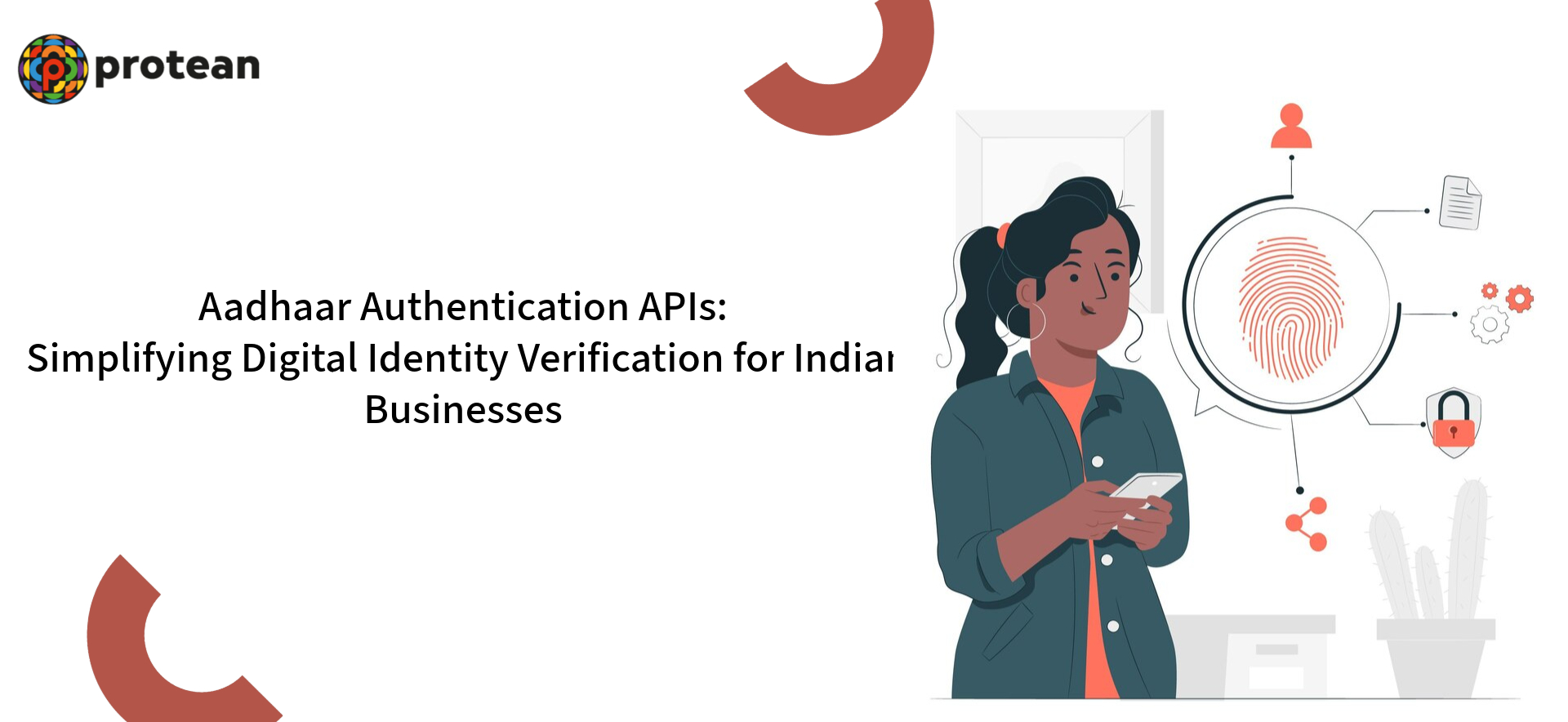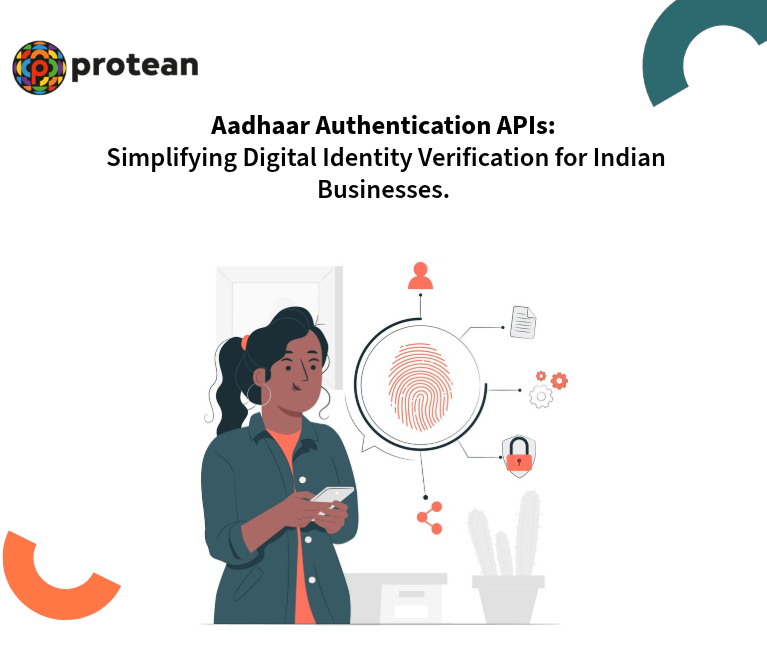We are witnessing a digital economy boom, and terms like Aadhaar authentication and Aadhaar verification are widely searched online.
From online banking to e-commerce checkouts, digital transactions have become a daily routine. As businesses digitise faster, identity verification becomes central to ensuring secure and seamless interactions. Here, Aadhaar verification online plays a vital role.
Aadhaar Authentication API systems are enabled by UIDAI. Aadhaar verification API has emerged as a game-changing tool in this space. These digital KYC APIs have enabled businesses to validate user identities in real time with unmatched accuracy and speed.
Furthermore, the recent policy changes have allowed private entities to access Aadhaar authentication services. Industries now have a powerful solution with eKYC or biometric authentication. These solutions can offer efficiency while remaining compliant.
Let us explore the various types of Aadhaar authentication APIs, their unique benefits, and practical applications across sectors like banking, fintech, insurance, telecom, e-commerce, and more.
Why Aadhaar Verification API Systems Matter
1. Seamless and Faster Onboarding
The UIDAI verification API or Aadhaar API can efficiently reduce manual processing time by up to 80%. This can enable users to complete KYC (Know Your Customer) procedures in real time. This can, in turn, lead to improved onboarding speed and less friction during registration.
2. Fraud Prevention and Security
Aadhaar authentication for businesses can ensure that only genuine users can complete onboarding or transactions. They can do this by leveraging biometric data and Aadhar OTP verification. This can reduce identity theft and enhance customer trust.
3. Regulatory Compliance
Aadhaar verification online can help businesses align with regulatory norms from RBI, SEBI, IRDAI, and UIDAI. Thus, Aadhaar-based KYC can ensure that businesses meet the compliance mandates set by the Indian regulatory bodies.
4. Cost Efficiency and Scalability
Digital identity verification with Aadhaar can help in eliminating paperwork and lower the verification costs. The Aadhaar authentication API is built to scale, making it better for both startups and big enterprises.
5. Better Customer Experience
A smooth and hassle-free KYC experience can boost user satisfaction and retention. This makes paperless KYC critical in competitive markets.
| Different Types of Aadhaar Authentication APIs |

Aadhaar APIs can offer multiple identity verification options tailored to different operational needs. These are as follows:
1. Aadhaar OTP Verification API
- How it works: The user enters their Aadhaar number and receives a one-time password (OTP) on their Aadhaar-linked mobile number. Entering the OTP completes the identity verification.
- Better for: It facilitates the remote onboarding for fintech platforms, telecom operators, and digital banking apps.
- Benefits: It is quick, user-friendly, and scalable and is also ideal for businesses looking to reduce friction in digital onboarding.
2. Aadhaar Biometric Authentication API
- How it works: It uses fingerprint or iris scans to verify identity against UIDAI's records.
- Better for: Banks, insurance firms, and government welfare schemes that require high-security, in-person verification.
- Benefits: It is highly secure, minimises identity fraud, and ensures the physical presence of users.
3. Aadhaar QR Code Verification API
- How it works: It scans the QR code printed on Aadhaar cards or e-Aadhaar to fetch and verify details.
- Better for: It conducts in-person verification at telecom outlets, retail counters, and banking branches.
- Benefits: It is quick and tamper-proof and reduces manual entry errors and speeds up verification.
4. Aadhaar Virtual ID (VID) Verification API
- How it works: It verifies identity using a 16-digit VID instead of the Aadhaar number.
- Better for: Industries focused on user privacy like digital lending and e-commerce.
- Benefits: It provides enhanced privacy as the Aadhaar number remains masked ensuring strong fraud protection.
5. Aadhaar eKYC API (XML-Based Verification)
- How it works: It utilises an XML file downloaded from UIDAI by the user to authenticate identity offline.
- Better for: Banks, NBFCs, and insurers conducting KYC without real-time UIDAI access.
- Benefits: It supports offline operations, tamper-proof, and privacy-respecting. It also meets regulatory requirements without requiring live connectivity.
6. Aadhaar Face Authentication API
- How it works: Aadhaar face authentication API can capture a live facial image and matches it with UIDAI records for verification.
- Better for: It is beneficial for elderly customers and users who may be unable to complete fingerprint or iris scans.
- Benefits: It is non-intrusive and accessible and great for telecom and government services.
7. Aadhaar Demographic Verification API
- How it works: It cross-verifies basic information (name, date of birth, address) against the UIDAI database.
- Better for: E-commerce platforms and educational institutions where minimal KYC is sufficient.
- Benefits: It is a quickest method, suitable for low-risk verification needs.
How to Choose the Right Aadhaar Authentication API for Your Business

| Choosing the right API depends on your business model, security level, and customer base. Here’s a quick approach to making a decision: |
Businesses can ensure that their choice aligns with regulatory guidelines. Aadhaar API for banks or Aadhaar API for fintech are particularly applicable when operating in sectors like banking or insurance.
The Role of Protean Aadhaar Authentication API in Simplifying Digital Verification
| Protean’s Aadhaar Authentication API can offer secure online transactions. Aadhar verification online can help businesses stay compliant, and a developer-friendly solution for businesses seeking to digitise their onboarding and verification workflows. |
Why should you choose Protean?
- Compliance: It fully adheres to UIDAI, RBI, SEBI, and IRDAI regulations.
- Real-Time Performance: It provides instant responses for seamless onboarding experiences.
- Broad Support: It includes OTP, biometric, face authentication, VID, XML-based eKYC, and QR code-based methods.
As reported by The Economic Times, in March 2025, more than 15 crore+ Aadhaar Authentication transactions took place, benefiting Aadhaar number holders seamlessly. Also, over 100 entities both in the government and private sector use face authentication for smooth delivery of benefits and services.
Who Benefits:
- Banks & NBFCs can reduce onboarding time and risk in loan approvals.
- Fintech Platforms can integrate scalable digital KYC with minimal friction.
- Insurance Providers can validate policyholders quickly and securely.
- Telecom & E-commerce can enable fast in-store or online identity checks.
Protean Aadhaar authentication API has simplified digital verification and helped businesses scale securely and responsibly.
Conclusion
Aadhaar authentication APIs are transforming identity verification in India. Whether your business prioritises security, privacy, speed, or compliance, there's an API that fits your needs. Businesses can reduce fraud, streamline KYC, and offer a better experience to customers by adopting the right verification method.
With private access now enabled, the time is ripe to integrate Aadhaar verification into your operations. Protean's Aadhaar authentication API can offer a future-ready solution that ensures your digital identity verification process is fast, safe, and compliant.
| Embrace Aadhaar-powered verification and build digital trust at scale. Contact Protean eGov Technologies now. |
Also read:
Mismatch in Aadhaar & PAN Details? Here’s How to Correct It
Aadhaar PAN link: How to seamlessly connect your financial identities online
- Protean has been & appointed as a Registrar of Unique Identification Authority of India (UIDAI) to facilitate registration of Residents for obtaining Aadhaar. Protean offers online Aadhaar authentication to validate the identity of the Aadhaar holder vis-à-vis UIDAI information.
Enhancing Social Welfare Access through Verifiable Digital Identity Systems

